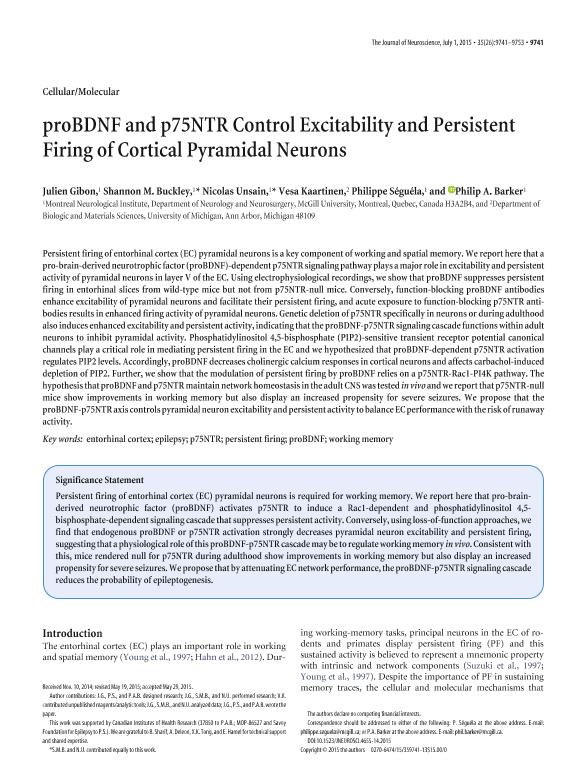Artículo
proBDNF and p75NTR control excitability and persistent firing of cortical pyramidal neurons
Gibon, Julien; Buckley, Shannon M.; Unsain, Nicolas ; Kaartinen, Vesa; Séguéla, Philippe; Barker, Philip A.
; Kaartinen, Vesa; Séguéla, Philippe; Barker, Philip A.
 ; Kaartinen, Vesa; Séguéla, Philippe; Barker, Philip A.
; Kaartinen, Vesa; Séguéla, Philippe; Barker, Philip A.
Fecha de publicación:
07/2015
Editorial:
Society for Neuroscience
Revista:
Journal of Neuroscience
ISSN:
0270-6474
Idioma:
Inglés
Tipo de recurso:
Artículo publicado
Clasificación temática:
Resumen
Persistent firing of entorhinal cortex (EC) pyramidal neurons is a key component of working and spatial memory. We report here that a pro-brain-derived neurotrophic factor (proBDNF)-dependent p75NTR signaling pathway plays a major role in excitability and persistent activity of pyramidal neurons in layer V of the EC. Using electrophysiological recordings, we show that proBDNF suppresses persistent firing in entorhinal slices from wild-type mice but not from p75NTR-null mice. Conversely, function-blocking proBDNF antibodies enhance excitability of pyramidal neurons and facilitate their persistent firing, and acute exposure to function-blocking p75NTR antibodies results in enhanced firing activity of pyramidal neurons. Genetic deletion of p75NTR specifically in neurons or during adulthood also induces enhanced excitability and persistent activity, indicating that the proBDNF-p75NTR signaling cascade functions within adult neurons to inhibit pyramidal activity. Phosphatidylinositol 4,5-bisphosphate (PIP2)-sensitive transient receptor potential canonical channels play a critical role in mediating persistent firing in the EC and we hypothesized that proBDNF-dependent p75NTR activation regulates PIP2 levels. Accordingly, proBDNF decreases cholinergic calcium responses in cortical neurons and affects carbachol-induced depletion of PIP2. Further, we show that the modulation of persistent firing by proBDNF relies on a p75NTR-Rac1-PI4K pathway. The hypothesis that proBDNF and p75NTR maintain network homeostasis in the adult CNS was tested in vivo and we report that p75NTR-null mice show improvements in working memory but also display an increased propensity for severe seizures. We propose that the proBDNF-p75NTR axis controls pyramidal neuron excitability and persistent activity to balance EC performance with the risk of runaway activity.
Palabras clave:
Entorhinal Cortex
,
Epilepsy
,
P75ntr
,
Persistent Firing
,
Probdnf
,
Working Memory
Archivos asociados
Licencia
Identificadores
Colecciones
Articulos(INIMEC - CONICET)
Articulos de INSTITUTO DE INV. MEDICAS MERCEDES Y MARTIN FERREYRA
Articulos de INSTITUTO DE INV. MEDICAS MERCEDES Y MARTIN FERREYRA
Citación
Gibon, Julien; Buckley, Shannon M.; Unsain, Nicolas; Kaartinen, Vesa; Séguéla, Philippe; et al.; proBDNF and p75NTR control excitability and persistent firing of cortical pyramidal neurons; Society for Neuroscience; Journal of Neuroscience; 35; 26; 7-2015; 9741-9753
Compartir
Altmétricas



